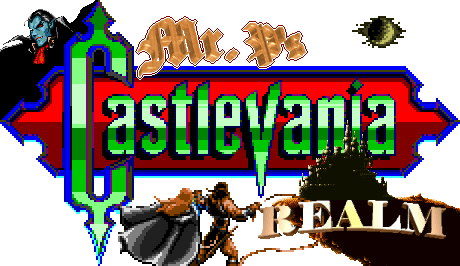
![]() Clash
of the Titans
Clash
of the Titans ![]()
Clash of the Titans, released in theaters in 1981, is a motion picture based on the life of Perseus, a hero from Greek mythology, with some revision. Produced by Ray Harryhausen and directed by Desmond Davis, Clash is a movie that was created during a time when filmmakers sought to wow audiences through mystic tales accentuated by technology and its ever-expanding boundaries. The architect of this movement, George Lucas, hit the jackpot with his Star Wars series, and his influence would be more profound than anyone would know. Thanks to this movement, studios were looking to cash in, and Harryhausen was given his first (and only) real chance at making a "big-budget" picture. And he had what he knew was the perfect vehicle to showcase his now-perfected stop-motion animation techniques...
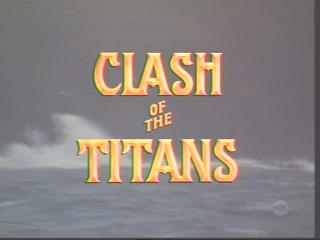
First we have to catch up on some backstory: The King of Argos, Acrisius, was in quite a bind. He had learned of a prophecy stating that his daughter's new son, Perseus, would one day kill him. Fearing the prophecy to be true, Acrisius ordered his soldiers to seize his daughter, Danae, and her newborn, lock them in a casket, and cast them out into the sea. This, he thought, would eliminate the threat. Acrisius, however, was blind to one major detail: Perseus' father was none other than Zeus, the supreme ruler of Mount Olympus and the Pantheon where the other gods resided.
 |
 |
This is where our story begins. After Acrisius' soldiers toss the casket-bound duo into the sea, we head on over to the mystical Mount Olympus, where the gods are about to discuss these happenings.
 |
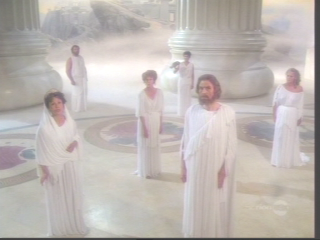 |
It's here we meet the council of gods: Hera (Claire Bloom), Thetis (Maggie Smith), Aphrodite (Ursula Andress), Poseidon (Jack Gwillim), Athena (Susan Fleetwood), Hephaestus (Pat Roach), and, of course, the mighty Zeus (Laurence Olivier). Zeus is very annoyed with Acrisius' actions (it was common for the gods to seduce human beings and then form a strong attachment to the offspring) and a reaction would indeed be forthcoming. The other gods, knowing Zeus to be acting on emotion, try to persuade him otherwise, but there's no reasoning with him--this is a character trait that defines his relationship with his brethren.

Zeus orders Poseidon, the god of the sea, to punish Acrisius by destroying Argos and all of its living habitants by releasing in its midst the fearsome sea creature known as the Kraken. "Destroy Argos!" he bellows. "Leave no stone unturned!" Upon its release, the Kraken--a four-armed version of King Kong, you could say--unleashes tidal waves all throughout the land, and the people flee in terror, helplessly, as the tsunami engulfs them. When it's all over, and all of Argos has been deprived of life, Zeus issues Poseidon one more order: To influence the ocean's flow as to direct the casket holding Danae and Perseus to a safe location.

The mother and son arrive on Seriphus, where they're allowed to live happily thereafter under the watchful eye of Zeus. We, too, watch, through the years, as Perseus (Harry Hamlin) grows up to be a brave and strong young man.
Meanwhile, back on Mount Olympus, there's another issue facing the council: Calibos, a handsome young man who is poised to marry Princess Andromeda and become ruler of the city of Joppa and ultimately all of Phoenicia, has been a bad boy lately. Calibos is Thetis' son, and the constant spoiling at the hands of his mother has made him a bit arrogant. He's done nothing but destroy all in his path to the top. As Zeus says, "I've given him the wells of the moon, but he's done nothing but destroy. Instead, he's hunted and killed every living creature, including my herd of sacred flying horses, except for the one that remains, Pegasus." Calibos, like Acrisius, will be punished. The distraught Thetis does all she can to change his mind, but she can't win. For his crimes, Zeus transforms Calibos into a hideous creature, a horned beast that no one could love. In his new form, Calibos is quickly outcast, shunned by his peers, and forced to live in the dark, damp swampland.
In retaliation, Thetis decrees that if Calibos will not marry Andromeda, then no man will. She talks to her loyal priests in their dreams to make sure that this order is clear. She expounds this notion by ordering that only a man whom can answer an impossible ever-changing riddle will be a worthy suitor, a tantalizing offer she knew could only end in grim fashion; those who fail to answer correctly, she hinted, will meet a fiery end. She also decides that if there will be divine intervention in her son's life, then Zeus' son, Perseus, will also have his fate decided by chance. Thus, she takes a sleeping Perseus from the safety of Seriphus and delivers him into the cold interior of a neglected coliseum that rests far away.
 |
 |
Perseus awakens in a state of panic.
To compound this predicament, shortly after, a masked and robed figure makes
a grand entrance and speaks to him in a frightening tone.
"WHO ARE YOU?" the cloaked figure
growls. "WHOOOO ARE YOU?"
The confused Perseus is lost for an answer.
"Where am I?" he repeats defiantly.
The keeper removes the mask to reveal the harmless Ammon (Burgess Meredith
of Rocky fame), an old poet and playwright who watches over the coliseum.
For plot purposes, he's also this movie's resident know-it-all.
"What do you mean, 'Where am I?'
You're in Joppa."
After Perseus tells his tale, that he was lying on a beach in Seriphus while
gazing at the moon, Ammon immediately recognizes it as the work of the gods.
Understanding this, Ammon offers his new friend asylum.
When Zeus becomes aware of these happenings,
he's outraged with Thetis' actions. He demands that his son be graced with
three weapons of divine power in return for this transgression. His wish is
granted, and when Perseus and Ammon awaken, they
find the three weapons--a sword, a shield and a helmet--adorning statues at
the base of the coliseum. They decide to investigate. First, they find that
the tempered golden sword can cut through solid marble without being scratched.
"By the gods," Ammon thinks. They're again surprised when the shield
calls to them. Zeus' vision appears in its interior and explains the weapons'
appearance, but he doesn't tell them whom he truly is.
"Guard well this shield, for one day,
it will guard your life."
""Wait! Who
are?" Perseus asks.
"Find ... and fulfill your destiny,"
the vision says, fading away.
"Never question
a gift from the gods, my boy," Ammon warns.
Perseus tries on the helmet, and he finds that it
offers him the power of invisibility. No notable trace can be found except
for the tracks he leaves behind. The impetuous youth then quickly takes off.
"Wait! Where are you going?" Ammon
yells.
"To fulfill my destiny!"
"Oh, dear--the young. Why do they never
listen? When will they ever learn?"
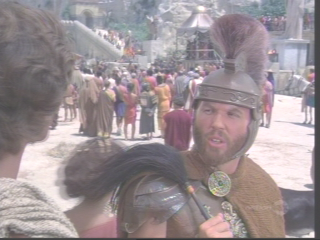
Perseus arrives at Fort St. Elmo, Valletta, where he meets and befriends Thallo (Tim Piggott-Smith), a soldier of the kingdom and the chief of the guards. Perseus learns two things: The city is suffering through a famine and an infestation of marsh flies, due to a curse put on it by Calibos; and at the temple, the Queen, Cassiopeia, is courting a suitor for her daughter, Andromeda--said to be the most beautiful woman in the world--by asking a riddle to any worthy subjects. Perseus and Thallo look toward the center of the town, where one who unfortunately got it wrong is being burned alive at the stake.
Not intimidated by this potential fate, Perseus sticks around until nighttime, and he uses his helmet to sneak into Andromeda's room.
 |
 |
He finds her asleep, and he's struck by her beauty. He's not sure about what happens next: A huge vulture carrying a caged transport swoops down onto the verandah and summons the princess' astral spirit, which separates itself from the sleeping woman and enters the cage. It then flies off, leaving Perseus only to wonder.
 |
 |
Perseus returns to the Coliseum where
he and Ammon discuss the event. Perseus is determined to find out where the
vulture has taken Andromeda's astral spirit, but he's stumped for a answer.
Ammon has a suggestion: He recalls a legend where on the night of a full moon,
the winged horse named Pegasus will descend from the sky and drink from the
river. They give it a shot, and they're pleased to find that the legend turns
out to be true. When Pegasus begins to drink from the river, the two are able
to capture and tame the flying beast as it drinks. Perseus rides the flying
wonder through the air, amazed by its beauty.
"We did it," Perseus says.
"No--you did it. Youuuu did
it," Ammon proudly corrects.
 |
 |
With his magic helmet, sword and shield in hand and the flying Pegasus as his ride, Perseus returns to Fort St. Elmo and waits for the vulture to return. When it does return to again transport Adromeda's astral spirit to wherever, the invisible Perseus follows closely behind. At the landing point, Perseus watches a meeting from afar.
Her summoner is none other than Calibos
(Neil McCarthy), the ruler of the swampland, who finds this to be the only
method of contacting her with the newest riddle.
"Why have you summoned me again?"
she asks, slightly annoyed.
Though the deformed and defeated Calibos still loves Andromeda, she finds
it impossible to love him back, even considering her memories of how handsome
he used to be. After giving her a necklace as a gift, he reminisces.
"Remember me how I was?" he sulks.
With a repellent look on her face, she responds,
"I remember, but now..."
"Then here's your next riddle," he
says in an disappointed and angry tone.
After the vulture leaves with Andromeda in tow, Perseus sneaks off. However, Calibos hears the patter of his tracks and follows him. He surprises Perseus in a marshy swamp by attacking from behind with his whip, knocking his shield away, into the depths of the marsh. Perseus eventually gathers himself, pulls out his sword, and relieves Calibos of his left hand.
Perseus again returns to Fort St. Elmo,
where the search for a suitor continues.
"Is there no one who is worthy of my daughter?"
Cassiopeia asks.
The confident Perseus barges in on the proceedings.
"You?" the surprised Andromeda blurts.
"You know this man?" Cassiopeia asks
her.
"Only ... from a dream," she replies. Turning
to Perseus, she continues: "I beg of you, abandon me."
"Ask me your riddle," he demands.
She recites the nonsensical riddle to him, not believing that he could possibly
answer it.
"Have patience, princess. What can it be? Three
circles joined, two moons and a crown."
"Tell me," she begs.
"The answer is a ring, the clawed hand
of Calibos, the lord of the marsh!"
He then produces the hand with the ring to cement his answer. His guess is
correct, and the people rejoice that their princess will now be able to marry.
"But what became of Calibos?" they
wonder.
"I spared his life on one condition,"
Perseus confides. "That he denounce his curse over Joppa."
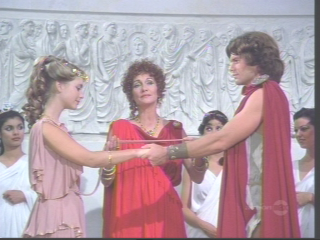
During the night, not one to honor
his promises, Calibos sneaks into the city and into a chapel, where he begs
his mother to take action against Perseus. A statue of Thetis comes alive
to try to console him.
"He's Zeus' son. There's nothing I can
do," she reveals.
"Then punish those who Perseus loves!"
he asks in desperation. "Convince your patron, Lord Poseidon, to release
the Kraken on Joppa. I demand justice!"
"Justice ... or revenge?" she questions
the pained Calibos.
Soon after, the ritual is underway to wed Perseus and Andromeda. But while talking up her daughter, Cassiopeia makes the fatal mistake of comparing her beauty to that of Thetis, which gives the goddess the justification to appear via her statue and take action on behalf of her son. She delivers this order: In ten days, Andromeda must be brought to seaside during sundown and be made a sacrifice to the Kraken, in retaliation for the cruelty brought upon her son. For if this order is not fulfilled, she promises to destroy the whole city.
In the meantime, Calibos and his minions locate Pegasus and capture the winged wonder, and they bring it back to their hideaway. This is Calibos' preemptive strike against what he knows is a fierce and determined enemy.
Within the temple, Perseus, Ammon and
Thallo urgently try to come up with a solution.
"There must be a way!" Perseus says,
ever steadfast.
"No--no way known to man," Ammon defies.
"Enough of your philosophy, old man. It's
time for action!"
"Now wait a minute," Ammon explains.
"I said that there's no way known to man, but there might be a
way known to woman."
Ammon tells him of the Stygian witches, three old and wise blind women who
are gifted with prophetic powers. Perseus gets an idea, but he's informed
that the witches live at least three days away.
"But how can we do this?" Ammon wonders.
"We have a flying horse," Perseus
thinks, "To Pegasus, three days is no more than three hours."
Thallo interrupts and speaks of the danger involved; he informs them that
the witches have a craving for human flesh--that the Queen once sent a group
of ambassadors to meet with the witches only for them to never return. Regardless,
Perseus insists that it's their only chance.
Meanwhile, Zeus learns of these happenings
and decides that it would serve Perseus well to have a new gift to replace
his lost shield.
"But what?" Athena questions.
"Your friend--Bubo the Owl. Give Perseus
your friend. It is all knowing, all seeing. Give it to him." He continues,
in a boastful manner: "It is my wish. My ... command."
"Never," she says to Bubo, her constant
companion, under her breath. "I will never part with you."
 |
 |
Instead, in defiance, she visits with
Hephaestus and requests that he build a lifelike clone of Bubo.
"He's quite skilled and ingenious,"
she says of the god of fire and forging. She then turns to Hephaestus to relay
her frustration: "Let great Zeus rage until all Olympus shakes, but I
will never part with you."
In the meantime, Perseus, Andromeda,
Ammon, Thallo, and some soldiers are unable to locate Pegasus, so they're
forced to almost hopelessly search for the lair of the Stygian witches. Just
then, Hephaestus' creation, a mechanical owl, called Bubo in honor of its
namesake, approaches them. (Some will note that Bubo is sort of a rip-off
of R2-D2, further showing Star Wars' influence.)
"Is it a hawk?" the concerned Ammon
asks. "What is it?"
"It's an owl. A golden owl!"
"It's another
gift from the gods," Ammon says surely.
Strangely, Perseus can understand perfectly the gibberish that their new mechanical
friend speaks.
"You understand all those clicks and whistles?"
Ammon wonders.
"It's perfectly clear to me. He says he
can show us the way."
Bubo leads them to the witches' lair. Once they arrive, they're forced to
scale a large mountain to reach the hidden domain. Before they enter, to make
it a less dangerous affair, Perseus draws up a plan.
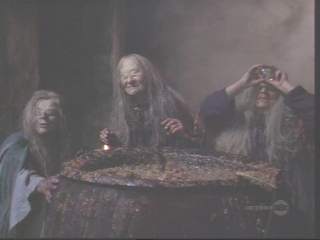
Inside, Perseus greets the Stygian
witches (Flora Robson, Anna Manahan and Freda Jackson), who are cooking up
one of their latest victims.
"Who is it?" they whisper.
"A man--a young man."
In order to see, the witches must use "the eye," which is some sort
of magic crystal that allows them to get a distorted but serviceable view
of intruders. As they inch closer, Perseus learns that the witches are more
interested in making him their next dinner. "Now!" he shouts, and
Bubo swoops in, grabs the eye, and delivers it into Perseus' hands. The witches
scramble, in a panic, to find in. Perseus promises to return the eye to them
if they answer his question.
"How can a mortal man face and defeat the
Kraken?"
"Impossible--the Kraken is invulnerable,"
they answer.
"Nothing is invulnerable!" he insists.
"There must be a way."
"Perhaps a way. But a way even more
dangerous than the Kraken itself."
"What is it?"
Another continues: "The head of Medusa,
the gorgon! One look from her eyes, alive or dead, can turn any living creature
into stone, no matter how huge or powerful. But first you must win
Medusa's head."
"One more question," Perseus ponders.
"What about her blood?"
"Deadly and poisonous."
With his questions answered, Perseus throws the eye onto the ground and quickly
exits.
Perseus and friends know exactly where
they have to go.
 |
 |
Leaving Andromeda and Ammon behind,
Perseus, Thallo and the soldiers head toward the River Styx.
"The River Styx," Perseus notes. "I
hear it has strange powers."
[Thallo--who they decide should stay behind
with some soldiers--throws Perseus a gold coin.]
"It's for Charon, the Ferryman."
Placed at seaside is a horn. Perseus blows into it and looks into the distance,
where the Ferryman appears and slowly rows its raft toward them. Perseus deposits
a gold coin into its skeletal hand, and he and the soldiers board the raft.
The Ferryman begins the journey over to the Isle of the Dead, which Medusa
calls home.
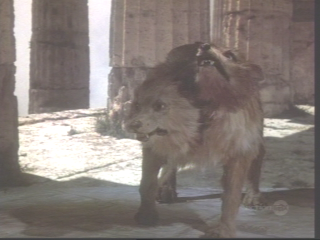
Upon arriving on the Isle of the Dead, they exit the raft and begin to inspect the outer regions. It's littered with stone statues that were once brave warriors. Something appears to be tracking them, they sense. As they near an entrance, suddenly, a two-headed hound (Dioskilus, which is just Cerebros missing a head) jumps out, knocks them all to the ground, and goes in for the kill. Perseus is unable to join the battle because a snake has now wrapped itself around his sword. After some soldiers fall, Perseus finally reclaims his sword and slays the beast one head a time.
They regroup and finally gain entrance
into the Medusa's dark and dank domain.
"Remember," Perseus instructs, "just
one look at her is enough. If you must see her, use the inside of your shields.
Her reflection cannot harm you."
Once inside, the hapless soldiers are picked off one at a time by the unseen
gorgon. When one such soldier is tripped up, he turns to see Medusa, which
he knows is the last thing he'll ever see.
 |
 |
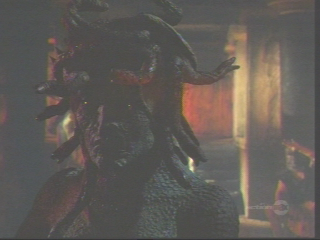 |
 |
This leaves just Perseus. As he hides his eyes, the bow and arrow-armed Medusa begins to fire frantically at him. He manages to deflect and block the shots with his shield. But the situation is perilous, and he knows that he's the last hope. As he hides behind a pillar, grasping at the shield that just saved him, he recalls his father's words: "Guard well this shield, for one day, it will guard your life." He gets an idea: He tosses his shield at one of the nearby stone figures, and it lands in the figure's arms (the "yeah, riiiiiight" move, as viewers will note). Medusa sees Perseus' reflection in the shield and fires an arrow at it; the statue falls to the ground.
Thinking that her work is done, she
slowly, methodically, slithers her way
toward the entrance to make sure that no intruders remain. As she inches her
way toward the pillar that cloaks Perseus, with his tension heightening, he
begins to withdraw his sword. When she finally draws near, he slashes the
sword outward using all of his strength, decapitating the mythic snake woman.
A huge sigh of relief is his only available emotion. Only the first step,
he knows, is complete.
 |
 |
Perseus leaves the Isle of the Dead, and he, Thallo and the remaining soldiers begin the journey back to Fort St. Elmo. When night hits, they decide to stop and rest. As they sleep, Calibos shows up. He spots the bag holding Medusa's head and plunges his new metal hand into it. He watches as the blood spills out of the bag and begins to transform itself into scorpions--those that grow five-times their normal size. Before Bubo can alert the others, Calibos uses his whip to knock it into the river; Perseus, however, hears the splash and awakens.
Perseus and the soldiers begin battling the scorpions. The remaining soldiers fall, each picked off by the scorpions' deadly stingers. But after retrieving his sword, Perseus is able to finish them off. However, he loses his last ally when Calibos attacks Thallo from behind and plunges his metal hand into the man's chest. As Perseus watches his friend fall, Calibos uses his whip to grab him by the neck. Perseus hits the ground and, with every last breath, struggles to reach his sword.
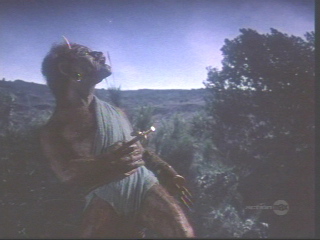
He stretches his arm using every last
ounce of strength, ekes his hand onto the handle of his sword, grabs it firmly,
and flings it at Calibos, impaling the king of the marsh and thus ending his
pain. The exasperated Perseus collapses,
almost breathless, to sip some of the river's water. He shows his only sign
of life when Bubo emerges from the river unscathed.
"Hello, my friend."
[Bubo responds with the usual gibberish.]
"If you can find him," Perseus says
to his mechanical buddy, "and he's still alive, you must find Pegasus."
Bubo, all knowing, flies directly to the location of Pegasus' holding. The witless vulture and minions of Calibos watch on as Bubo begins setting the place ablaze by picking up and dropping torches onto the ground. They flee in a state of shock and stupidity, and Bubo is able to free Pegasus from its cage.
Our focus returns to Fort St. Elmo, where Andromeda is being all beautified in preparation for her sacrifice. As the soldiers escort to her seaside, the drum beats foretell of a grim ending to this tale. They chain her to a large rock and move away in dread of the Kraken's arrival.
On Mount Olympus, the time has arrived.
"Sundown nears, my Lord," Thetis reminds
everyone.
"Very well,"
Zeus sighs as he directs his attention to Poseidon. "Release the Kraken."
With the push of an underwater lever,
Poseidon releases the feared titan.
 |
 |
The behemoth surveys the situation and moves in to inspect its prey. It's seconds away from snatching Andromeda from her holding position when Bubo swoops in, temporarily distracting the monstrosity. It disposes of Bubo using the hurricane-like force of its breath. Hope is not yet lost, as a Pegasus-bound Perseus rides in and flies near the Kraken, at eye-level; however, he struggles to open the bag containing Medusa's head, and the Kraken takes advantage by clawing at Pegasus, knocking both it and Perseus into the sea.
Perseus swims to a nearby rocky shore,
and it seems that he's out of luck. Just then, Bubo regains its senses and
springs back to life; it locates the bag, swoops in, grabs it, and drops it
off into Perseus' hands.
 |
 |
Perseus pulls out Medusa's severed head and holds it toward the air. The Kraken takes one glance over and begins to writhe in pain as its fate is all but decided. Slowly, a stone state overcomes the Kraken, and, before long, it's nothing but a large sculpture of a former titan; the continued eye-contact with Medusa's head causes it to break apart, piece by piece, and fall into the sea. Having no more use for it, Perseus then reels back and tosses Medusa's head into the sea. To symbolize the victory, Pegasus emerges from its watery confines and flies off into the sunset.
Perseus frees Andromeda and they embrace. Joppa is safe, finally, and it'll live to know a new, rejuvenated leadership.
"Perseus has won--my son!" the extremely
proud Zeus proclaims. "My son has triumphed."
"A fortunate young man," Hera insists.
"Fortune is ally to the brave," he
retorts.
"What a dangerous precedent. What if there
are more heroes like him? What if courage and imagination became everyday
mortal qualities? What would become of us?" Thetis fears.
Zeus consoles: "We would no longer be needed.
But for the moment, there is sufficient cowardice, sloth and mendacity down
there on Earth to last forever.
As we fade toward the stars, Zeus immortalizes their story: "Perseus and Andromeda will be happy together, have fine sons, rule wisely. And to perpetuate the story of his courage, I command that from henceforth, he will be set amongst the stars and constellations. He, Perseus, the lovely Andromeda, the noble Pegasus, and even the very vain Cassiopeia--let the stars be named after them forever. For as long as man shall walk the Earth and search the night sky in wonder, they will remember the courage of Perseus. Even if we, the gods, are abandoned or forgotten, the stars--they will never fade. Never. They will burn until the end of the time!"
The End
Back